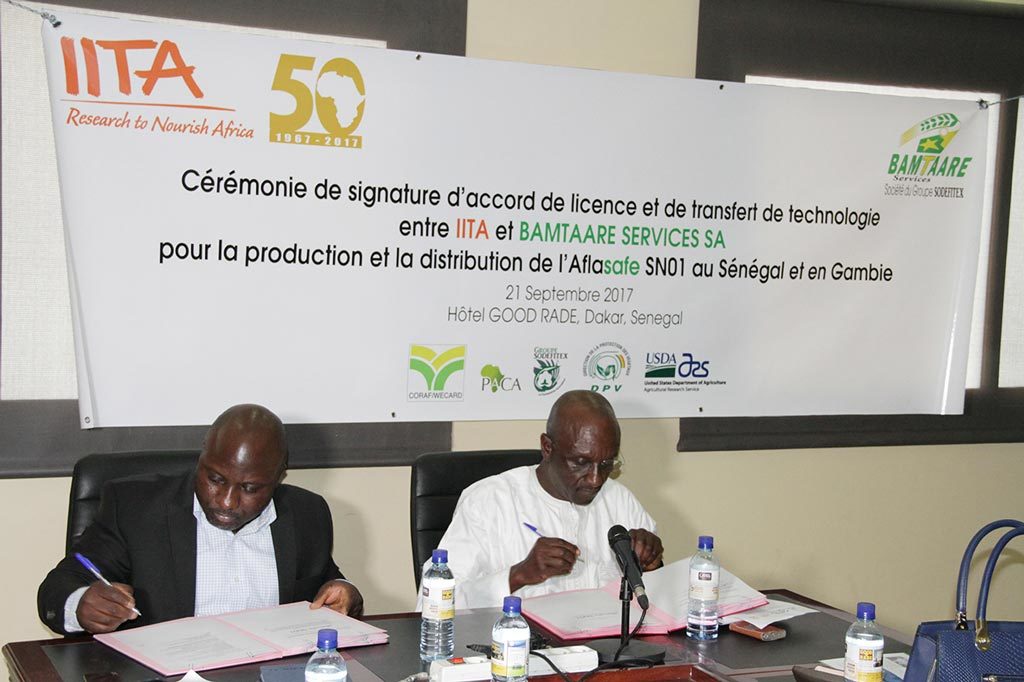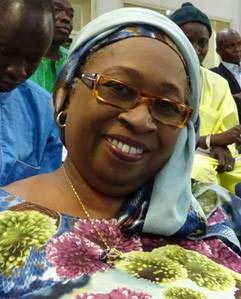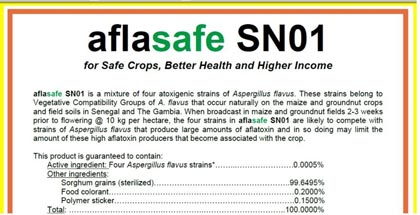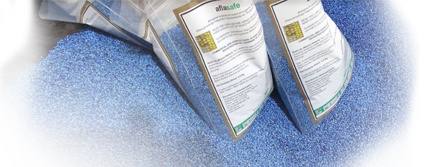Aflasafe is an all-natural product for Africa that fights aflatoxin in food: customised for each country or region, Aflasafe reduces aflatoxin by up to 99%. In Senegal, local Aflasafe production commences mid-2018, with today’s signing ceremony paving the way…
DAKAR, SENEGAL, 21st September 2017 – Today in Dakar, both Senegal and The Gambia simultaneously took a giant leap forwards in technology to fight aflatoxin. BAMTAARE SA has signed a Technology Transfer and Licensing Agreement (TTLA) with the International Institute of Tropical Agriculture (IITA) for local manufacture, distribution and sale of Aflasafe SN01™. With this, construction of an Aflasafe SN01 factory at Kahone, Kaolack Region, Senegal, will immediately commence. Production will start in June 2018. The factory will be fully owned, operated and managed by BAMTAARE, which will finance its construction, while IITA will provide technical and business-development support.
To assure broad and wide Aflasafe distribution, the business-to-business performance-based agreement signed today spells out annual production and distribution targets to be met. The company expects to produce and distribute 1,300 metric tonnes of Aflasafe in Senegal and The Gambia by the fifth year, translating into 130,000 hectares of Aflasafe-protected groundnuts and maize.

“Our vision of success is that every maize and groundnut farmer have access to Aflasafe where and when needed,” said Mr Abdou Konlambigue, the Managing Director of IITA’s Aflasafe Technology Transfer and Commercialisation Project (ATTC). “We are very proud to partner with BAMTAARE to bring Aflasafe closer to farmers in Senegal and The Gambia.” Mr Konlambigue revealed, “This is the first licence granted to a private company in Africa, and we are fully committed to make it successful.”
“Today marks a turning point in our policy to diversify agri-business,” said Mr Ahmed Bachir Diop, CEO, BAMTAARE Services SA and Director General, SODEFITEX. “Aflasafe is one of nine strategic intervention areas in our ‘SODEFITEX Horizon 2020’ strategic plan. This is why we are investing 430 million CFA francs to set up an Aflasafe factory with a production capacity of 1,600 tonnes per year. We are very pleased with the partnership that we have sealed today with IITA.”
“Tackling aflatoxin is a multi-faceted issue that requires acting in concert and coordination on many fronts,” added Dr Kenton Dashiell, IITA’s Deputy Director General for Partnerships for Delivery. “No single institution working alone has the answer, which is why partnership with both the private and public sectors is so crucial.”
Aflatoxin is a real and present danger in Africa’s food, affecting key staples such as maize and groundnuts, which are both very common foods in all of sub-Saharan Africa. The Gambia and Senegal are no exception.

The effects of aflatoxin on Africa’s health and wealth are immense. It causes an estimated 5–30% of liver cancer worldwide, the highest incidence being in Africa (30%). An invisible poison that you cannot see, taste or smell, aflatoxin suppresses the immune system and stunts child growth. Poisoning can begin even before birth through mother-to-baby transmission. Thereafter, young children could continue ingesting aflatoxin through bottle and breast milk, and weaning on maize- or groundnut-based diets. It is an unforgiving and cumulative poison, piling up in our bodies as we continue to eat and drink contaminated foods. So dire is the problem that in some countries, studies show nearly all (more than 95%) of the children under five have aflatoxin in their body, indicating high aflatoxin exposure even at this early age.
Internally, approximately 40% of the produce in African markets exceeds the aflatoxin maxima allowed. Externally, Africa potentially loses up to USD 670 million annually in lost export opportunities. In the 1960s and 70s, 66% of The Gambia’s agricultural export revenue came from groundnuts. Since then, this has fallen drastically due to aflatoxin. Similarly, according to the United Nations Food and Agricultural Organization, Senegal’s groundnut exports tumbled to nearly half, from a high of 51,450 tonnes in 1970 to 26,635 tonnes in 2013. And as happens in most of Africa, the groundnuts that fail to meet the stringent aflatoxin regulations in export markets are sold locally and regionally. So, while consumers in external markets are aflatoxin-protected, Africa’s consumers are not.
Aflasafe is the game-changer for aflatoxin in Africa’s food. Developed in Africa and customised to tackle the types of aflatoxin found in each country or region, Aflasafe reduces aflatoxin by up to 99%. To guarantee its effectiveness because Aflasafe is not a one-size-fits-all product, Aflasafe is registered and marketed with a unique identifier suffix for the various countries and regions. For Senegal and The Gambia which share an ecosystem and fall in the same ecoregion, the product name is Aflasafe SN01, currently solely distributed and marketed by BAMTAARE SA in both countries. Aflasafe SN01 was officially launched in Senegal and The Gambia earlier this year, in March.

Aflasafe SN01 was developed by IITA in collaboration with the United States Department of Agriculture – Agricultural Research Service, and with local and international research-and-development partners in both Senegal and The Gambia. These were The Gambia Groundnut Corporation (now the National Food Security Processing and Marketing Corporation), the National Agricultural Research Institute of The Gambia and the Crop Protection Division. Partners in Senegal included La Direction de la Protection des Végétaux du Sénégal, L’Université de Thiès and the African Agricultural Technology Foundation (AATF).
Links
- More on Aflasafe and aflatoxin: Q&A | Text and video
- How Aflasafe works, and how to use it – The Gambia
- ATTC Project
Contacts
- Business inquiries to order Aflasafe, or Aflasafe-treated groundnuts or maize – BAMTAARE SERVICES Groupe/SODEFITEX, Km 4.5 boulevard du centenaire de la commune de Dakar; DG Sodefitex or Goule Gueye, Tel : 338897950
- Media inquiries: Njeri Okono, Communications Specialist, ATTC Project
About SODEFITEX: Established on 15th March 1974 as a mixed public–private ownership company with a public ownership majority, besides cotton agri-business, SODEFITEX also supports rural development. Through a special institution, BAMTAARE (Pillar for Methods and Techniques for Agriculture, other Rural Activities and the Environment – Base d’Appui aux Méthodes et Techniques pour l’Agriculture, les autres Activités Rurales et l’Environnement), SODEFITEX is an exemplar in providing support for rural development. BAMTAARE’s successor is BAMTAARE Services – a public limited company with a Board of Directors. BAMTAARE Service is a 100% subsidiary of SODEFITEX.
About ATTC: The Aflasafe Technology Transfer and Commercialisation Project (ATTC) implemented by IITA identifies strategic options for partnership with private companies or government entities, executes those partnerships, and helps ensure the distinct Aflasafe products reach millions of farmers. The project will contribute to improved food safety and increased income for smallholder African farmers through using Aflasafe. ATTC’s target is to cover half-a-million smallholder hectares with Aflasafe in 11 countries where Aflasafe is − or is likely to soon be − a nationally registered product. These are Nigeria, Kenya, Senegal, The Gambia, Burkina Faso, Ghana, Malawi, Mozambique, Tanzania, Uganda and Zambia. ATTC’s activities are geared to increase Aflasafe’s availability and accessibility, and to improve access to lucrative aflatoxin-conscious markets for maize and groundnuts. Download our project brochure










